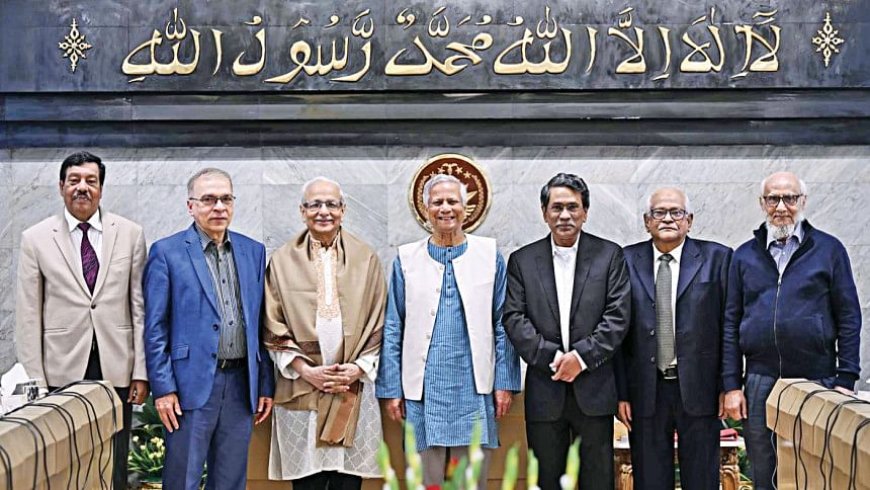A new era dawns for the nation
Yunus comments after receiving reports from four reform commissions; discussions with political parties scheduled for mid-February.

Chief Adviser Prof. Muhammad Yunus stated yesterday that a new chapter has begun as the reform commissions have outlined a roadmap for the Bangladesh envisioned by its people.
Speaking at the Chief Adviser’s Office in Tejgaon around 11:30 a.m., Prof. Yunus made these remarks while receiving reports from the commissions on constitutional, electoral, police, and anti-corruption reforms.
"Many reports come to me, and I carry out the formalities of receiving them. However, today’s [Wednesday’s] event goes beyond such formalities; this is a historic moment," he said.
He praised the commissions’ efforts, saying, "The vision of a new Bangladesh we aim to build was placed in your hands. You have drafted the framework of this dream, marking the start of a new chapter."
Prof. Yunus emphasized the importance of collaboration, stating, "We will consult widely, ensuring these reforms resonate with everyone and align with our commitments. Your work provides the foundation for these discussions, and you will play a key role in guiding them."
Present at the event were Prof. Ali Riaz, chief of the Constitution Reform Commission; Badiul Alam Majumdar, chief of the Electoral Reform Commission; Iftekharuzzaman, chief of the ACC Reform Commission; Safar Raj Hossain, chief of the Police Reform Commission; and other commission members.
Since assuming office in August, the interim government has formed at least 15 commissions to strengthen democratic institutions and build a state system based on public ownership, accountability, and welfare. The first six commissions—focused on reforming the constitution, electoral system, police, judiciary, public administration, and the ACC—were established on October 3, with a 90-day deadline for submitting their reports. Deadlines for the judiciary and public administration commissions were later extended to January 31, and the others to January 15.
Prof. Yunus highlighted the significance of the commissions’ work: "A devastated nation has risen anew, standing tall with renewed vigor. This resurgence has created history. Now, the challenge lies in fulfilling the commitments we’ve undertaken. We are confident we can achieve this."
He described the commission reports as a "charter for a mass uprising" and a foundation for a consensus-driven Bangladesh. He expressed hope that all political parties would endorse the reforms, calling it a manifesto for the nation’s future.
Elections, Prof. Yunus added, would proceed under this charter, and the formation of a consensus-based government would ensure its continuity and realization. "Without consensus, this charter will be lost. Its implementation is vital," he said.
Talks with Political Parties
Environment Adviser Syeda Rizwana Hasan announced that the government might initiate formal discussions with political parties in mid-February to reach a consensus on the reform initiatives.
Speaking at a press briefing at the Foreign Service Academy following the submission of the four commission reports, Rizwana stated that a roadmap for reforms could be presented within a month, aligning with public and political party expectations.
She confirmed that all political parties’ opinions had been considered in the preparation of the reports. Additionally, she revealed that the Chief Adviser would lead the upcoming "Political Consensus Commission."
Law Adviser Prof. Asif Nazrul added that while the government aimed to complete its reform agenda during its tenure, progress would depend on the level of consensus among political parties. He also noted that the International Crimes Tribunal would likely complete at least the trial proceedings before the next election.
What's Your Reaction?





















































































